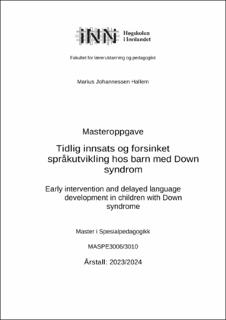Tidlig innsats og forsinket språkutvikling hos barn med Down syndrom
Master thesis
Permanent lenke
https://hdl.handle.net/11250/3103366Utgivelsesdato
2023Metadata
Vis full innførselSamlinger
Sammendrag
Norsk sammendrag
Dette er en masteroppgave i Spesialpedagogikk, som handler om tidlig innsats og forsinket språkutvikling hos barn med Downs syndrom. Tematikken som er undersøkt i masteroppgaven tar utgangspunkt i følgende problemstilling: Hvordan arbeider barnehagene med tidlig innsats og forsinket språkutvikling hos barn med Downs syndrom? Formålet med oppgaven er å undersøke og drøfte perspektivene til ulike fagpersoner i barnehagesektoren, som arbeider med tidlig innsats og forsinket språkutvikling hos barn med Downs syndrom. Jeg mener at barnehagene har et utrolig viktig ansvar i å legge til rette for barns språklige utvikling, spesielt barn med særskilte behov. Barnehagene har et ansvar om å støtte og hjelpe ut ifra barnets egne behov, men også et ansvar om å tenke helhetlig om barn med ulike behov. Der de både må ha en helhetlig og individualistisk tilnærming mot barn med Downs syndrom. Barnehagene har ulike arbeidsmetoder, rammer og mål for det allmennpedagogiske tilbudet de gir barna som de forholde seg til. Derfor mener jeg det er interessant å undersøke hvordan den enkelte barnehage arbeider med å legge til rette for det spesialpedagogiske arbeidet for enkeltbarnet med Downs syndrom, samtidig som de bevarer den helhetlige tanken og inkludere dette i det allmennpedagogiske tilbudet barna får i barnehagen.I dette prosjektet har problemstillingen blitt undersøkt gjennom en kvalitativ tilnærming, der fire ulike fagpersoner i barnehagesektoren har blitt intervjuet. Oppgaven bærer preg av både en induktiv- og deduktiv tilnærming til analysen og utviklingen av analysekategorier. Detteoretiske bakteppet og tidligere forskning er innhentet på bakgrunn av oppgavens forskningsspørsmål og problemstilling, i tillegg er kategoriene sentrert og utviklet rundt informantenes perspektiver og erfaringer. I drøftingskapittelet tar jeg utgangspunktet i ulike kategoriene som er utviklet opp mot oppgavens forskningsspørsmål og problemstilling: tidlig innsats, forsinket språkutvikling, ulike hjelpemidler og samarbeid.Funnene i prosjektet viser hvordan barnehagene arbeider med tidlig innsats og forsinket språkutvikling hos barn med Downs syndrom, men dette arbeidet avhenger av en rekke variabler. Informantene løfter frem barnehagens organisering, bruk av hjelpemidler og kompetanse som viktige områder. På bakgrunn av analysen av de empiriske funnene i oppgaven, etablerte jeg ytterligere en kategori, der samarbeid med ulike instanser og barnets foreldre ble løftet opp og sett som essensielt i arbeidet. Engelsk sammendrag
This is a master´s thesis in Special Education, wich deals with early intervention and delayed language development in children with Down syndrome. The theme is investigated based on the following research question: How do kindergartens work with early intervention and delayed language development in children with Downs syndrome? The purpose of the thesis is to shed light on the perspective of various professionals that works in the kindergarten withchildren with Down syndrome, and to discuss their perspectives on how they work with early intervention and delayed language development in children with Down syndrome. I believe that kindergartens have an incredibly important responsibility in facilitating childrens language development, especially children with special needs. The kindergarten support and help the children based on their needs and prerequisites, but the kindergarten also have a responsibility to have both an holistic approach and a individualistic approach towards the children with Down syndrome. The kindergartens operate within the restrictions of the National framework for Kindergartens, and need to asses how they can incorporate and facilitate the special education work for invidual children with Down syndrome, while at the same time preserving the holistic ideas and including this in the general educational offer the children recieve in the kindergartens.In this project, the issue has been investigated through a qualitative approach, where four different professionals in the kindergarten have been interviewed. The assignment bears the hallmarks of both an inductive and deductive approach in the analysis, due to the fact that the theoretical background and previous research has been obtained and centered around both the professionals' experiences and perspectives, in addition to the fact that large parts of the theory take the starting point in the assignment research questions and problems. In the discussion chapter, I take the starting point in the various categories that have been developed in response to the thesis' research question and issue: early intervention, delayed language development, various aids and cooperation.The findings in the project show that the kindergarten works with early intervention and delayed language development in children with Down syndrome, but this depends on a number of variables. The informants highlight the organisational methods, use of language tools and professional competence as important areas. Based on the analysis of the empirical findings in the thesis, I established a further category that shows that collaboration was central to the work and could be linked to the other categories in the thesis.
